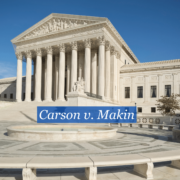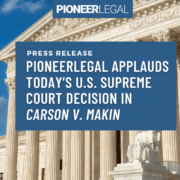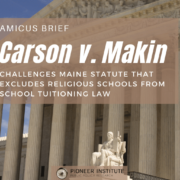Challenges Maine statute that excludes religious schools from school tuitioning law
BOSTON – Pioneer Institute has filed an amicus curiae brief in Carson v. Makin urging the Supreme Court of the United States to strike down a provision of Maine law. The Court will hear oral arguments in Carson this morning (December 8) at 10 am. The Maine law being challenged allows districts that don’t have their own schools to contract with a school or pay for students that choose to attend public or private schools, but explicitly excludes religious schools.
The Court’s 2020 ruling in Espinoza v. Montana Department of Revenue, a case in which Pioneer also filed an amicus brief that was cited by Justice Samuel Alito in his concurring opinion, Chief Justice John Roberts wrote in his majority decision that “A state need not subsidize private education. But once a state decides to do so, it cannot disqualify some private schools solely because they are religious.”
“Maine law allows parents to access the public or private education that best suits their children – except if the school is religiously affiliated,” said Pioneer Institute Executive Director Jim Stergios. “We believe Espinoza makes it clear that such a provision runs counter to the Constitution.”
For over a century, until the early 1980s, religiously affiliated schools were included in the Maine school tuitioning program, under which communities that don’t have their own schools can either contract with a school or allow parents to use the per-pupil spending allotment to attend the public or private school of their choice.
The Maine state legislature, driven by the Senate chair of the education committee, re-codified the program in 1982 to prohibit parents and students from using the law to access religious schools, as was originally intended in 1873.
The Pioneer brief was co-authored by Michael Gilleran of Fisher Broyles and Ryan McKenna. Gilleran also was the lead attorney in Pioneer’s amicus brief in the landmark Espinoza case.
“We believe the Maine law clearly doesn’t pass constitutional muster under Espinoza, Gilleran said. “I hope this case will reiterate the Court’s position and open educational opportunity to more students across the country.”
The Court is expected to rule on the case before its current term ends at the end of June 2022.
For well over a decade, Pioneer Institute has used its legal work, research, events, polling, and op-eds to highlight nativist, anti-Catholic educational and legal barriers to school choice in Massachusetts and across the country. In 2018, Pioneer produced a 30-minute documentary, “Big Sacrifices, Big Dreams: Ending America’s Bigoted Education Laws,” that chronicles the struggles of four families in Massachusetts, Michigan, and Georgia, all states with so-called Blaine amendments that prohibit public money from flowing to religiously affiliated schools, to send their children to parochial schools.
About the Author
Michael C. Gilleran is a litigation attorney in Boston, and a partner in the national law firm of FisherBroyles, LLP, who has been active for many years in the cause of educational choice. He is currently Vice-Chair of the Board of Trustees of Thomas More College in New Hampshire and Rome. Formerly he was Chair of the Advisory Board of Catholic Charities of Greater Boston. For many years he has received the SuperLawyer© designation from Boston Magazine as well as the AV rating (preeminent) from the national Martindale-Hubbell attorney rating service. He is the author of a leading book on Massachusetts law, published by the largest national legal publisher, which is frequently cited by Massachusetts courts including the Massachusetts Supreme Judicial Court. His many legal articles have appeared in such publications as the American Bar Association Journal. He is frequently asked to give presentations on important issues of Massachusetts law with leading judges.
About Pioneer
Pioneer’s mission is to develop and communicate dynamic ideas that advance prosperity and a vibrant civic life in Massachusetts and beyond. Pioneer’s vision of success is a state and nation where our people can prosper and our society thrive because we enjoy world-class options in education, healthcare, transportation and economic opportunity, and where our government is limited, accountable and transparent. Pioneer values an America where our citizenry is well-educated and willing to test our beliefs based on facts and the free exchange of ideas, and committed to liberty, personal responsibility, and free enterprise.


